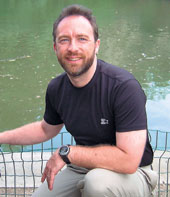 |
At 40, idea man Jimmy Wales has all the enthusiasm of a child playing with his favourite building blocks, arranging and rearranging them to see what else he can come up with. Because that’s what Wales, founder of Wikipedia, is doing with his central idea and the passion that rules his life — the free and unrestricted exchange of information on the Internet.
If one likens the Internet to a vast, mostly unexplored ocean, Wales might well be one of its first Christopher Columbuses. And Wikipedia — www.wikipedia.org, the free multilingual Web-based encyclopedia developed and maintained by user-generated content, one of those landmark discoveries that have changed this exciting new world.
We catch up with Wales, or ‘Jimbo’ as he likes to be called, in Bangalore where he’s arrived to speak at a CII seminar on information exchange. He is relaxed, affable and seemingly inexhaustible as he fields questions from Bangalore geekdom in spite of a harrowing cough that threatens to drown out his voice. “If I seem to start choking, don’t worry, I just need some water,” he jokes.
Interest in the Wikipedia project is at an all-time high, he confirms, and nowhere more so than in India. Currently, his focus is on expanding the ethnic language versions of the free encyclopedia. Several Indian languages have their own versions of Wikipedia and some, including Bengali, have more than 1,000 articles each. (To put that in perspective, the English edition has more than 1 million articles.) “I want to promote the idea of Indians editing and adding Wikipedia articles in their own languages,” says Wales.
The website, one of the 20 most popular, has become the one source a Net-savvy generation turns to when it wants quick, easily understandable information on anything from Woodstock to Open Source Computing. How is it different from a conventional encyclopedia? “It is radical, it has content generated by users and it is best at neutrality and moderation, at providing calm and measured debate,” believes Wales.
It is true that any user can make changes to any Wikipedia article and it is also true that this has led to vandalism in the past. “But as more and more people started editing articles, the system came up with its own self-checks,” says Wales. With thousands of users logged on 24/7, it is difficult for a corrupted article to survive long, for someone is sure to come along and correct it. Also, Wales does not think any encyclopedia qualifies as a primary source. He sees Wikipedia as “more reliable as background reading on subjects than most online sources”, calling it a “work in progress”.
As with any project involving large numbers of people, there is a core group that shoulders the maximum responsibly. “Wikipedia is not 1 million people each adding one sentence each. It has always been managed by a tight-knit community of volunteers who care for the content,” Wales explains. A study he undertook revealed that no more than 615 people were responsible for more than half the edits done to the English Wikipedia. The number of people actually hired by the Wikimedia Foundation that runs Wikipedia among several other projects is an incredible five. It operates out of St Petersburg, Florida, where Wales also lives, while Wikipedia’s main servers are in Tampa, Florida with additional servers in Amsterdam and Seoul.
Born in a small town in Alabama, USA, Wales was taught at a private school run by his family. Later at university, he started work on a PhD in finance, but dropped out. After making a fortune in stocks, he started a search portal for men called Bomis that also unapologetically sold adult content. Interestingly, Bomis was the rather unconventional source of most of the cash that went into setting up Wikipedia and its predecessor Nupedia.
 |
One question that journalists never fail to ask him is how the project is run financially, Wales says. “Donations and fund drives, mainly,” is his answer. Another issue that dogs Wales and the website is that of reliability. While he agrees that there is still scepticism about the validity and accuracy of Wikipedia articles, trust is growing. Wales quotes a study done by Nature magazine last year that compared Wikipedia articles on scientific and natural science topics with those on the same subjects from the Encyclopedia Britannica. “Britannica had three mistakes per page, Wikipedia had four,” says a visibly pleased Wales.
At the same time, it is true that controversial and high profile articles get much more attention and are more prone to correction than more obscure ones. A new system now makes sure that while a new user can make changes to an article that’s been ‘flagged’, the changes won’t be live till a registered user (who in turn has been on board for more than 4 days) clears it.
Wales is now intent on expanding the project into further new and uncharted territories. There’s a free dictionary (“free as in liberated, not just free as in something you don’t pay for”), textbook project Wikibooks, and his current pet project, Wikinews. As a believer in citizen journalism and as an American citizen who's somewhat lost faith in traditional new sources, Wikinews — operating on similar user-generated logic — is especially dear to him.
In his own words, what he is really trying to do is create a world in which “every single person on the planet is given free access to the sum of all human knowledge”. On the Internet today, he sees an explosion of creativity and more community-oriented activities. “I see a new culture emerging, a culture that is based not on market exchange but on intellectual exchange,” he says. That is his vision of the world he’s helping to shape.

